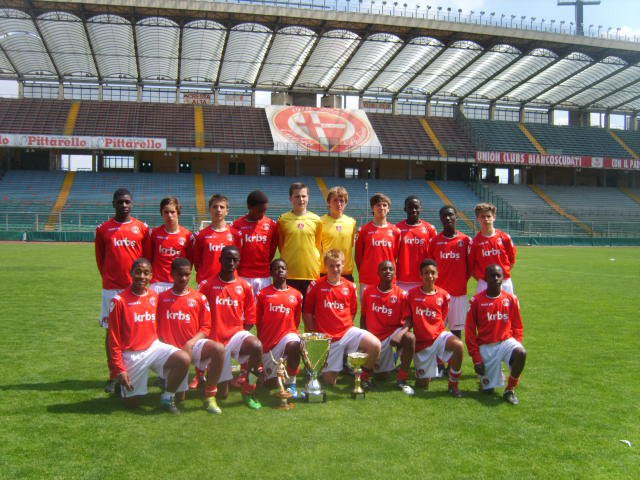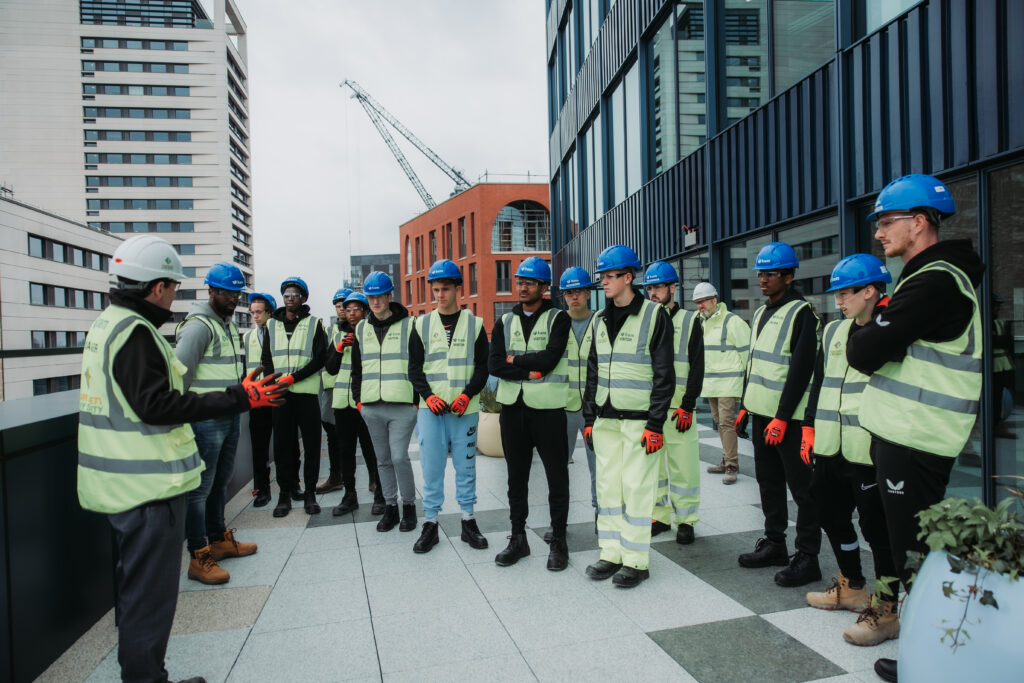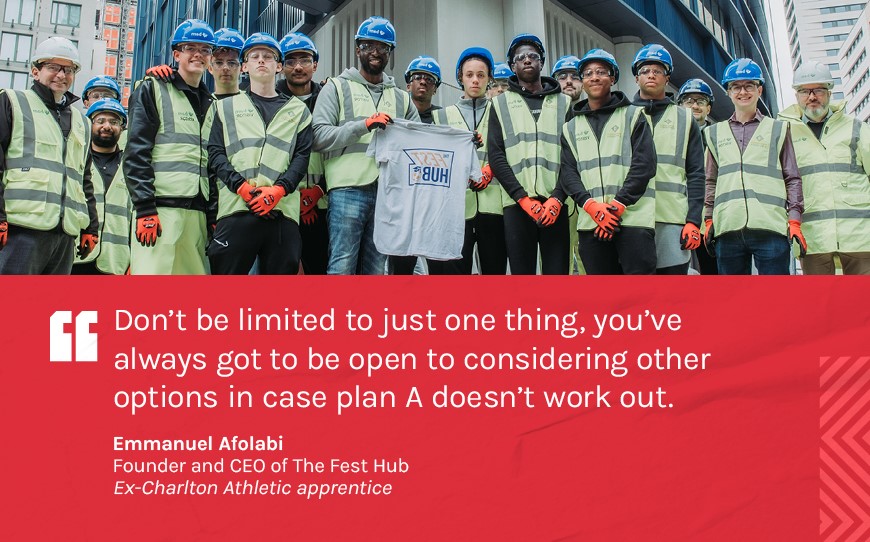Having signed for Charlton Athletic at the age of just eight years old, Emmanuel Afolabi progressed through the Addicks ranks as part of a very talented age group. “We had a good team. There was me, Joe Gomez now of Liverpool and England, Esri Konsa who’s at Villa… Ademola Lookman, now out at Atalanta in Serie A,” Afolabi told LFE. “I got to age the age of 12 and they (Charlton) offered me and Joe Gomez four-year deals. Only me and Joe signed them, which effectively kept us at the club until U16s. But when we were like 14/15, they offered us both two-year scholarships early, so I knew I’d be at the club until I was at least 18. It was a good experience.”

However, when Emmanuel’s scholarship with Charlton ended, he wasn’t offered a professional contract, a decision that the then 18-year-old sensed was coming. “When I became a scholar, I didn’t get as many minutes as I wanted, so I didn’t get that time to develop as much as I wanted to at that moment in time, which is probably the most important time in your career. I missed out on a lot of development. I sort of sensed it was coming, like I said I didn’t get as much playing time as I should have got. I mentally prepared myself for it to be honest. I knew the time would come; it was just a matter of when. So, when they brought me into the office and gave me the news, it was just like ‘it is what it is’, it was just unfortunate really.”
Following his release, Emmanuel initially hoped to earn another contract elsewhere, but a combination of factors made finding a new club hard. “It was a difficult time. Essentially, you’re just left alone to fend for yourself. I didn’t have an agent or anything, so that’s what kind of messed me up. I went to other clubs through a scout at Charlton, so they did try and help me out in that way, but it was hard. I went to Colchester, Barnet and Crystal Palace after leaving Charlton, but unlucky for me, they already had players in my position who had three- or four-year professional deals, so it was always going to be hard for me to get in there and try and replace them, especially not having played as much football as I’d have wanted to near the end of my time at Charlton. It was difficult, I went to a few clubs and was let down, so the only option was to go lower and lower and that knocked my confidence a little, so I just decided to hang my boots up for a bit and do something else.”
In the initial weeks and months after his journey at the Valley ended, Emmanuel took time to focus on himself to try and come to terms with the position he found himself in and work out what he wanted to do next. “I just disengaged from people and tried to focus on myself, try and figure things out myself. I distanced myself from everyone at home. I was a bit embarrassed, because everyone knew me as ‘the footballer’, so I was like ‘what am I now?’, I didn’t have an identity anymore.
“Even still now, it’s difficult. Growing up, that’s what everyone knew me as. Initially I felt like I’m now just another person. When you’re a footballer, that’s your thing. When you’re no longer a footballer, it’s back to normal. It’s a difficult transition, I’ll be honest. You’ve just got to be mentally strong and keep on the right track. I just decided if I wasn’t going to be a footballer, I still wanted to be something, it was just a matter of what.”
Just before he left Charlton, the idea of university was posed to Emmanuel, something that he’d never had to consider before. “When I was at Charlton still, the support came from the Education Manager. He said university was an option, so he helped me think about that, because I wasn’t thinking about that at all. Luckily for the former Charlton apprentice, a cousin of his was in the civil engineering field and that paved the way for Emmanuel. “I did have a bit of an interest in engineering, but my focus was football. I didn’t really know how to get into engineering, but, luckily for me, I had that support. I just kind of followed in his footsteps.”
After deciding to pursue a potential career in STEM (Science, Technology, Engineering & Maths), Emmanuel embarked on a new adventure by enrolling at the University of East London. “When you’re a scholar, you do a BTEC, but when I went to go to university, I didn’t have enough UCAS points to get onto a decent course, so that was a bit of a hindrance. I went to the University of East London and I’m from East London myself, so I wanted to stay local. I ended up doing an entry level course in Maths and Physics, which eventually gave me the credits to move onto first-year, but I’ll tell you what, after the first month or two, I was about ready to quit. I was thinking ‘I’ve stopped playing football and now I’m doing crazy maths and science!’, but I just kept at it. I knew my plan A was gone, so I had to make damn sure that plan B worked out. I was sure of that, and I was going to do everything in my power to make that happen. I followed the right steps, hung around with the right people, I was very determined. I’m scared a failure man, I’d done it once, I couldn’t fail again. That’s why I put so much effort into everything that I do.”
During Emmanuel’s time at university, he was offered an internship at his local council working as a Trainee Civil Engineer, an opportunity which would eventually create a lot of opportunities for the former LFE learner. “When I was in second year at university, my class were offered placement jobs. Only like three of us applied, but I saw it as a big opportunity to gain some good experience before graduating, so I was surprised that most people didn’t apply. I was lucky enough to get an interview and get a placement. I did my placement year, then I worked at the same company part-time during my third year at university, for Newham Council as a Trainee Civil Engineer. That gave me the experience I needed. The company I work for now, Ramboll, they gave me an interview after university, and I got the job straight away! It was a smooth transition.”
“I now deal with below ground drainage and highways. When you talk about STEM and engineering, it’s important for countries to thrive and develop. If countries don’t have this, it’s hard for them to develop. When I’m walking down the street now, I look at curbs and drains and I can see what’s wrong with them! (laughs). It (civil engineering) helps you understand the world better.”

Alongside his day-to-day job at Ramboll, the 26-year-old runs an organisation of his own – The Fest Hub. Founded by himself in 2021, The Fest Hub aims to help young people from disadvantaged backgrounds and professional football club scholars get involved with STEM based careers. “The year I started my graduate scheme at Ramboll, I was like four months in, and I was just listening to TALKsport, and they were discussing the general lack of support for players. I’ve always had quite an entrepreneurial mind, so me being an engineer, I thought ‘if I can do it, why can’t other players who don’t make it go into it as well’, so essentially, I started The Fest Hub to combine the two. I’ve been there, you get released and you don’t know what to do, so I wanted to use my experience to give back to the boys and girls.
“The FESTHub connects football and STEM. We’re reaching out to schools and football clubs to try and engage them with STEM and what’s around them in the world as well. Plus, STEM companies are always looking for new people, new talent. There is always going to be jobs available within the industry. Footballers for example, what they don’t realise is that engineers build their training ground and other facilities. I think footballers should know what goes into it whilst also playing and doing their thing.
“I try to invite different organisations to come in and help inspire and engage the students in STEM learning, because a lot of the time these kids are from disadvantaged communities, so they don’t really have that connection with anyone within the industry, so we bring engineers in and try and open their eyes to the different possible careers that they can go into. We discuss roles and responsibilities in a construction project. We also do activities, things that can get their mind working and used to working in a team, but we like to link it all in with football to bring a different dynamic. We’re going into football clubs, so the whole aim of the project is to use those clubs to engage the young people in STEM, that’s the uniqueness about it all. It’s not a common thing within the industry, I’m the only person who really does this and it comes from my own life story.”

Emmanuel’s story is one of perseverance and self-belief. Not only did he not allow rejection at a young age define him, but he also used the unfortunate circumstances as motivation to excel in a different field – something that he believes, anyone is capable of. “Don’t be limited to just one thing, you’ve always got to be open to considering other options in case plan A doesn’t work out. Think about something else other than football that they could potentially venture into. People don’t believe it will happen to them (get released), like me, I didn’t think it would happen to me. But just because football doesn’t work out, it does not mean that’s the end of everything, you can go on and do something else. I think that’s the beauty of our programme, I’ve been in their shoes, I can relate to them. My story is to try and inspire. Don’t keep your head down, keep pushing.
“The FESTHub company slogan is: ‘you can’t become what you can’t see’”.
Each year, the company Emmanuel works for, Ramboll, holds awards to recognise the outstanding achievements and work that employees have contributed to the organisation. The winners were recently announced, with Emmanuel picking up the ‘Culture & EDI Champion’ award. “I am deeply honoured and humbled to win this award. I want to express my gratitude to the organisation worldwide for recognising me and the work we do at The Fest Hub. I am also incredibly grateful to my family and friends, and mentors who have supported me throughout my journey. I’ve worked extremely hard since I was released from Charlton in 2015 and never let the disappointment affect my mental health. I’m dedicating this award to the all the football academy players, both boys and girls, who never achieved their dream. Life isn’t over, you can always change paths and succeed elsewhere”
To find out more about The Fest Hub, visit www.thefesthub.org
This feature is included in the latest edition of Touchline magazine. Click here to download issue 45.





